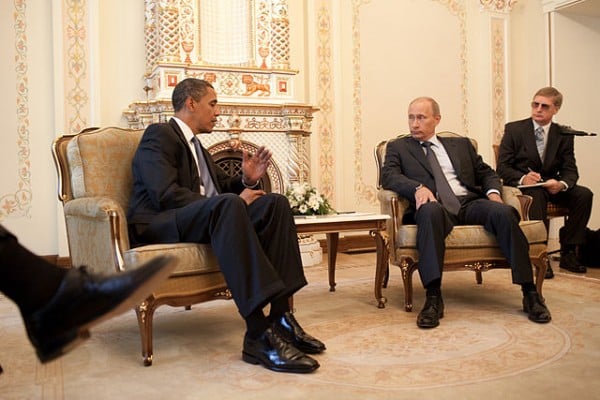
“We took back some folks.” (Photo Credit: Pete Souza)
The recent meeting of German, French, Russian and Ukrainian leaders to begin a cease-fire in Eastern Ukraine has already been broken. The rail hub of Debaltseve in Eastern Ukraine has been evacuated by the Ukrainian army after a heavy rebel attack. There were limited hopes for the success of the latest cease-fire negotiations, but with a plan likely already in place by rebels in their conflict with the Ukrainian army, a cease-fire may only hold when yet unknown objectives are met or a face saving agreement can be established to the satisfaction of Vladimir Putin.
Western countries are having a difficult time handling the situation in Ukraine. Despite a civilian airliner being shot down in 2014 and evidence to show that Moscow is supporting the rebels in Eastern Ukraine, Europe and the United States have no idea to what extent Russia may go if NATO decides to openly support Ukraine with lethal weapons support. The structure that kept the Cold War “chilly” no longer exists. The nuclear arms race of the 1960s to the 1980s is not deterring aggression in Ukraine, and it seems as if NATO and its larger force are unwilling to challenge Russia in order to support a wholly independent Ukraine. Only bad options exist for Western countries that are tired of wars in the Middle East. A strong response with troops on the ground could readily extinguish threats in Iraq and Syria, but Western countries will not even take on that achievable challenge, never mind challenging the Russian army.
It is highly doubtful that Western countries would want their young soldiers dying on the fields of Eastern Ukraine. The average Russian likely does not want to reignite the Cold War, but there is a good chance a limited hot conflict would be in the cards if Russia’s direct border is facing a threat. Ukraine has always been Russia’s “English Channel,” keeping strong opponents away from its borders. Giving up regions of Eastern Ukraine is one option that policy experts have discussed, as it is clear that the Ukrainian army will get little support in defending those regions on the border. Acquiescing to rebels in Ukraine may satisfy their demands and re-establish the feeling of protection Russians have had for generations. There is a good chance however that a creeping conflict deeper into Ukraine might be the end result, and at some point lethal support will become more palatable to Western countries.
Discussions on what kind of support should be given to the Ukrainian army vary, as the size and strength of Ukrainian forces is the subject of disagreements. Suggestions of giving defensive support to Ukraine in the form of anti-tank missiles, likely the Javelin weapons system, might serve to injure the rebels and their armor enough to create a real cost for Russia and sour any local support for further conflict. Such weapons can destroy heavy and expensive tanks and armored vehicles and create a situation where rebel soldiers would feel vulnerable and hesitate venturing deeper into Ukraine. While Russian army regulars do have systems to knock out anti-tank rockets, they are on a limited number of tanks and would be overwhelmed in a larger conflict.
Challenging Russia might give Putin more incentives to open a full conflict between the Russian army against Ukraine. Bad options seem to have come soon after the failed cease-fire. If the cease-fire does not hold any longer Western leaders may have to abandon Ukraine or ask generations of young people to contribute to a new terrible war. To what extent seems to be Putin’s option.